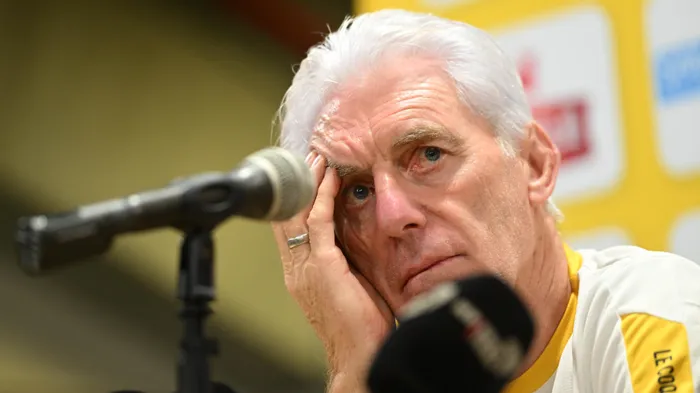PSL's congested fixture list sabotages Bafana Bafana's preparation for World Cup qualifiers
COMMENT

Coach Hugo Broos Coach Hugo Broos might be sitting with players who are fatigued because of the heavy fixture load over the past month.
Image: BACKPAGEPIX
As the weekend’s Betway Premiership fixtures conclude on Sunday, the looming challenge for Bafana Bafana has become all the more urgent.
The national squad, largely made up of players from Orlando Pirates and Mamelodi Sundowns, is nearing the point of exhaustion. With five rounds of league matches and MTN8 fixtures crammed into just one month, many of these players are running on empty — just days before they are expected to report for national duty ahead of the 2026 FIFA World Cup qualifiers.
The strain has been particularly evident despite the season still being in its early stages. Mamelodi Sundowns, who have six players called up by coach Hugo Broos, have endured a punishing run of games, further compounded by their curtailed pre-season due to participation in the FIFA Club World Cup.
Pirates have similarly been stretched thin, with seven players named in the national squad, in addition to Namibian international Deon Hotto. Both clubs have been playing twice a week for nearly a month—an unsustainable load by any standard.
Concerns over player welfare have once again put the Premier Soccer League (PSL) under scrutiny. Critics argue that the PSL’s scheduling has not taken into account the importance of ensuring Bafana Bafana’s readiness for high-stakes qualifiers. There were clear opportunities to pause league play midweek in the lead-up to the international break, giving players adequate rest before transitioning to the demands of national training camp. Yet no such adjustments were made.
Instead, Sundowns are scheduled to travel to Cape Town for a match this afternoon, while Pirates are set to play in Gqeberha on tomorrow afternoon. This tight turnaround makes it unlikely that several key players will be able to report for camp on time. Ideally, national players should arrive on a Sunday to prepare for Monday’s first training session. But it now seems probable that the Pirates contingent will only be available from Monday — hardly optimal for a team preparing for crucial fixtures.
Adding to the challenge, six members of the Bafana Bafana squad ply their trade overseas. The usual anxieties around international call-ups apply: injuries, club hesitations, and delayed releases. Broos may well face a Monday scenario where medical reports trigger late withdrawals, or worse, he’s left in the dark about why certain players haven’t arrived.
Such circumstances make the already complex task of preparing a cohesive team even more difficult. It is not the first time the national coach has found himself having to scramble to identify and call up replacements due to vague or delayed communication. These disruptions jeopardise the effectiveness of the national setup just as South Africa attempts to assert itself on the road to the 2026 World Cup.
The PSL has been warned before about the pitfalls of its scheduling, particularly in the context of national team obligations. Irvin Khoza, who is both the chairman of Orlando Pirates and the head of the PSL, must now face renewed calls to reassess priorities. A balance must be struck between club and country, with player welfare at the centre of all decision-making.
National team appearances elevate player profiles and, in turn, increase market value — benefits that flow directly back to the clubs and the league. The popularity of Bafana Bafana is rising once again, and the visibility of players on the international stage brings undeniable value to South African football as a whole.
It is time for the league to take measurable steps to support the national cause. A coordinated, player-first scheduling strategy is not just a courtesy — it is a necessity if South African football hopes to compete at the highest level.
Related Topics: